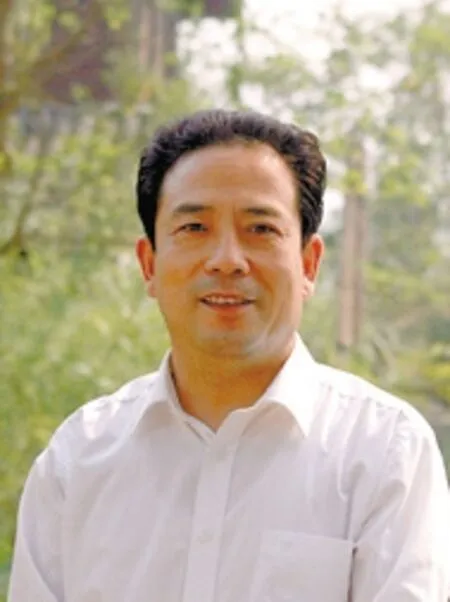Confidence
2017-08-03ByCheYangao
By Che Yangao
Confidence
By Che Yangao

Back in the days when boats and horses were the main vehicles in the South and North respectively, Li Bai (701–762), a well-acclaimed Chinese poet from his own day to the present as a genius and a romantic figure who took traditional poetic forms to new heights, showed his wild and splendid imagination by composing the verse– “In the midst of clouds all glowing, Baidi, I left you at dawn. By evening I'll be home at Jiangling, a thousand miles I've gone.”
In an era where slowness ruled, vehicles traveling “at a snail’s pace” hindered not merely the progress of the times, but the mentality and vitality of mankind as well. Even Emperor Xuanzong of Tang Dynasty himself, eager to please his concubine Yang Yuhuan with fresh litchi, had to wait for delivery by horses racing in relay between countless courier stations and whose reins were gradually worn away during the tiresome journey. Thus, Li Bai put together a powerful ending to his poem–“Ten thousand folds of mountains, my skiff has slipped them by,” a verse that actually expressed the poet’s yearning for the rapidity of high-speed transport.
Today, many of the ancient fantasies have been turned into reality, for example, “Motionless, on earth I travel eighty thousand li a day; touring the heaven I command a distant view of many a Milky Way”, quoted from“Farewell to the God of Plague” by Mao Zedong (also known as Chairman Mao, who was a Chinese communist revolutionary, poet, political theorist and founding father of the People's Republic of China.) and the heroic feeling of “we can clasp the moon in the Ninth Heaven, and seize turtles deep down in the Five Seas” quoted from“Reascending Jinggang Mountains” by Mao Zedong, are no longer imagination and exaggeration simply existing in literary works. If the deceased authors had the chance, they might have been wondering: did we predict the future, or did our descendants help achieve our prediction?
In fact, we can easily seek evidence from our daily life, for example, when the cherry blossom in Wuhan University starts to flourish in exuberant profusion, some Chinese grannies, with a keen appetite for square dancing, come in pairs from neighboring cities like Changsha and Yueyang to admire the flowery scene. Those grannies are convinced that they are a living embodiment of spring. Some people say, the tights covering their thighs and waist cannot cover up the fact that their youth has long gone, yet they refuse to give in, and they take square dance as a relieving sanctuary for their heart.

The trip from Changsha to Wuhan is a long-distance one. Interestingly, however, the grannies can go dancing first, and then return home to settle all the housework, and ultimately ride a shared bicycle to the high-speed railway station with their dancemates. They are calm andunhurried, as if someone else has arranged everything properly for them. In fact, it is the modern internet service and high-speed transport that back them up with such confidence. With an ID card in hand and the Alipay app on the phone, they can access any train station with ease, scan the QR code on a shared bicycle to unlock it, hail a taxi, and feel free to roam the streets and lanes in a strange city. Certainly they would not travel just for the sake of it, as in their opinion, it is such a waste of time if they do not post selfies and travel blogs in the Wechat (equivalent to Whatsapp, one of the most popular messaging apps in China today.) All along the way, they admire the scenery and share the beauty of it, but deep down inside, they regard themselves as the real beauty.
More importantly, after all the sightseeing and fun, they could still manage to shuttle between the two cities, and return home after enjoying the cherry blossoms within one single day. In the evening, you will find them dancing at the square, as gorgeous as the cherry blossoms as ever.
(Translated: Zhu Yaguang )
在南船北马为主要交通工具的时代,李白能写出“朝辞白帝彩云间,千里江陵一日还”的诗句,足见其想象力之狂放奇绝。
生活于慢时代,蜗行牛步羁绊的不仅是岁月的进程,还有人的心性和活力。所以即便天子情急,想一骑红尘讨妃子欢心,也只能借马蹄追风,让数不清的驿站反复解系越来越瘦的缰绳。所以诗人在最后一句突然豪迈放声:“轻舟已过万重山。”其实是对风驰电掣速度的极度向往。
许多古人的幻想,都已演化为今天的现实。如“坐地日行八万里,巡天遥看一千河”,如气势豪迈的“可上九天揽月,可下五洋捉鳖”,都不再是文学想象和夸张。倒是诗句的作者若九泉有知可能要问:究竟是吾等具有前瞻性,还是后人成就了吾等的前瞻性。
其实对照现实更容易从生活中得到验证,如武大樱花盛开时节,长沙、岳阳一些醉心于广场舞的大妈是要结伴来赏花的。她们跳舞时非常自恋,认为自己就代表春天。有人认为她们尽管腰腿上绷着紧身衣裤,但已经回不到青春。可她们心有不甘,把广场舞作为一份福利,在这里给自己的心放假。
有意思的是从长沙到武汉是出远门。可她们一定会先去跳完广场舞,然后回家把家务安排停当,才与邀约的同伴踩着共享单车去高铁车站。她们十分从容,好像一切都有人替她们操持好了。其实是现代网络服务和高速交通给了她们底气。她们只需身份证和手机支付宝就可以方便进出高铁站,刷共享单车或呼滴滴打车,就可以自由穿行在陌生城市的大街小巷。当然她们是不白跑路的,如果不在朋友圈里晒晒自拍和心得,那在她们简直就是浪费。她们一路看,一路分享,其实骨子里是自己把自己当风景。
更重要的是,她们看的看了,玩的玩了,还能做到穿梭湘鄂两地间,赏罢樱花一日还。晚上的广场舞还有她们的身姿,依旧花枝招展。

车延高 Che Yangao
Che Yangao is a well-known poet, who won the Annual Outstanding Poetry Award by October, a fomous literary magazine in China, in 2006, and was selected as the Annual Outstanding Poet by Poetry Monthly in 2007 as well as the Top 10 Poet by The Poems Deity and the Outstanding Poet by Shikan in 2008. In 2010, he won the Lu Xun Literature Prize. His collection of poems include Life, Wake Up the Dawn, Yearning for Warmth and Collected Poems by Che Yangao, and his prose works include Appreciating Li Bai in a Drunken Stupor.
著名诗人。2006年获《十月》年度优秀诗歌奖,2007年获《诗歌月刊》年度优秀诗人奖,2008年获《诗选刊》年度十佳诗人奖,同年获《诗刊》年度优秀诗人奖。2010年获鲁迅文学奖。著有诗集《日子就是江山》《把黎明惊醒》《向往温暖》《车延高自选集》,散文集《醉眼看李白》等。
底气
文|车延高
